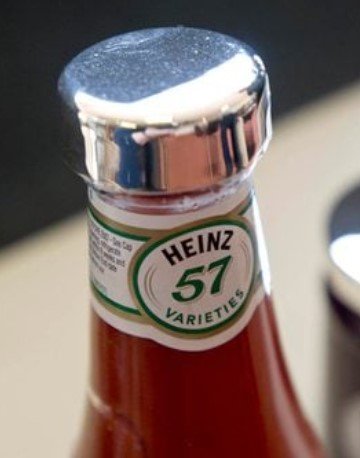If you’ve ever picked up a bottle of Heinz ketchup, you’ve probably noticed the number 57 printed on the iconic glass. It’s a small detail that has sparked curiosity and speculation among ketchup enthusiasts for decades. Does Heinz actually produce 57 different varieties of ketchup? Are there 57 secret ingredients that make their ketchup so delicious? Or is it simply a random number with no significant meaning? Let’s dive into the fascinating origin of this enigmatic number.
According to the Smithsonian, one day Henry J. Heinz, the founder of the H.J. Heinz Company, was on a train when inspiration struck. He happened to see an advertisement in the train car that boasted “21 styles” of shoes. This caught his attention, and he realized that catchy slogans and memorable numbers could have a powerful impact on consumers, even if they weren’t entirely accurate.
Heinz understood that the number on the ketchup bottle needed to resonate with consumers. He wanted a number that would stick in people’s minds and create an impression of variety and quality. Five was his lucky number, and seven was his wife’s lucky number, so he combined them to create the number 57. It had a nice ring to it and, more importantly, it had the potential to become an unforgettable symbol for his brand.
The number 57 quickly became a central element of Heinz’s marketing strategy. Some claim he believed that if people tapped the bottle’s “57” mark, it would make the ketchup flow out more easily. While this isn’t true, the clever marketing ploy encouraged consumers to interact with the bottle and reinforced the notion that Heinz ketchup was special.
Despite the longstanding association with the number 57, it’s important to note that Heinz actually produces more than 57 products today. The company offers a wide range of condiments and sauces, but the number 57 remains an enduring symbol of Heinz’s heritage and commitment to quality.
The significance of the number 57 doesn’t end there. In fact, it has sparked a debate among ketchup enthusiasts and historians alike. Some argue that Heinz initially had 57 varieties of products, not just ketchup, which included various pickles, relishes, and sauces. Others suggest that the number 57 represents the 57th product Heinz introduced, which happened to be ketchup. While these theories sound plausible, there isn’t concrete evidence to confirm either claim definitively.
Regardless of the true origin, the number 57 has become deeply ingrained in the Heinz brand. It’s a recognizable symbol that has stood the test of time and continues to evoke nostalgia for generations of ketchup lovers. The fact that people still wonder about the number’s meaning and discuss its possible origins speaks volumes about its lasting impact.
So, the next time you grab a bottle of Heinz ketchup and notice the number 57, you can appreciate the fascinating story behind it. While Heinz may offer more than 57 products today, the number remains an enduring emblem of the company’s commitment to excellence, innovation, and the power of clever marketing. It’s a delightful reminder that sometimes, in the world of branding, a little mystery can go a long way.
